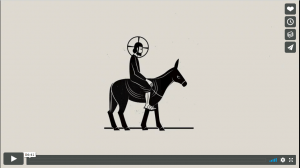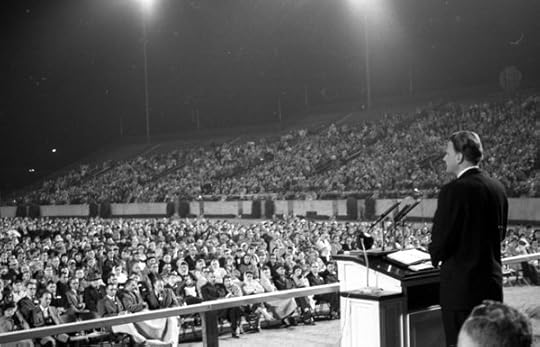Justin Taylor's Blog, page 34
March 26, 2018
The Final Week of Jesus: Sunday–Monday (March 29–30, AD 33)

Each day this week I’ll post a video on what happened during the original Easter week of April, AD 33. The two videos above are the entries for Palm Sunday and Monday.
For more information, including a day-by-day guide with the complete biblical text and commentary, you could pick up the Kindle version of The Final Days of Jesus: The Most Important Week of the Most Important Person Who Ever Lived by Andreas J. Köstenberger and Justin Taylor.
“An enlightening and edifying look at the most important week in history. Both those who want to know more about the history and those who long to behold the wonder will find much to love about this great work. One gets the sense that we should proceed through these pages on our knees.”
—J. D. Greear, Pastor, The Summit Church, Raleigh-Durham, North Carolina; author, Not God Enough and Stop Asking Jesus Into Your Heart
“You may be wondering what can be done to make Christ’s last week come alive in ways it hasn’t before. It would help to understand the historical background and cultural script a little better, but you don’t want a big book. It would help, too, if your authors were trustworthy, knowledgeable evangelical scholars who could write clearly for laypeople. Look no further—this is the book for you!”
—Craig L. Blomberg, Distinguished Professor of New Testament, Denver Seminary
“Whether you’re a Christian seeking to defend your faith, an inquirer wanting to know what really happened with Jesus, or a disciple who wants to know the Lord more fully, The Final Days of Jesus will instruct and encourage you. It lays out the truth with coherence and conviction. I will point people to this book because it so clearly and faithfully explains what happened in the final days of Jesus. Here is the truth, based on the Gospel accounts. Here is the center of the Christian story, filled with insight and inspiration.”
—Mark D. Roberts, Executive Director of Digital Media and the Theological and Cultural Steward, Foundations for Laity Renewal; author, Can We Trust the Gospels?
“This is an immensely helpful guide to the last week of Jesus’s life—historically, theologically, and devotionally. Historically, it provides a likely chronology of Passion Week, chock full of historical, cultural, and geographical insights. Theologically, the authors provide the text of the four Gospels with helpful commentary, noting the theological contributions of each evangelist. Devotionally, the reader has the privilege of walking with Jesus through the most important week of human history—the climax of God’s redemptive plan. A feast of insights for both mind and heart.”
—Mark L. Strauss, professor of New Testament, Bethel Seminary
“Jesus’s last week shook but also saved the world. From Palm Sunday to Easter morning, each day and encounter were critical. This book leads the reader step by step along Jesus’s route from triumphal entry to the cross and finally to glory. Numerous maps and diagrams shed fresh light on each Gospel’s claims. We are reminded not only of what Christ did but also where his way points us now. An excellent beginning-to-intermediate guide!”
—Robert W. Yarbrough, professor of New Testament, Covenant Theological Seminary
“Holy Week is arguably the most sacred time of year for Christians. Andreas Köstenberger and Justin Taylor provide a simple yet eloquent survey of the final week of Jesus’s life. They take readers on a pilgrimage through the Gospels and invite us to follow Jesus in his triumphal entry into Jerusalem, on to the dark and tragic moments of Golgotha, and through to the glorious and unspeakable joy at the feet of the risen Jesus. In short, this is a wonderful resource for individuals, families, and fellowships to learn more about the Easter story, the greatest story ever told.”
—Michael F. Bird, Lecturer in Theology, Ridley College, Melbourne, Australia; author, Evangelical Theology
“A clearly presented overview of the most important week in world history. Brief, helpful comments illuminate the biblical story and bring home its enduring and life-changing message.”
—Douglas J. Moo, Kenneth T. Wessner Chair of Biblical Studies, Wheaton College; Chair, Committee on Bible Translation for the NIV
“The Final Days of Jesus helps believers take note of the historical events leading up to Jesus’s death on the cross. Readers are challenged to see the provocation that Jesus’s message and life represented, leading to his arrest and execution. The book demonstrates that historical facts and Christian worship can and should go hand in hand.”
—Eckhard J. Schnabel, Mary F. Rockefeller Distinguished Professor of New Testament Studies, Gordon-Conwell Theological Seminary; author, Paul the Missionary
“The center point of history is the death and resurrection of Jesus Christ, the Son of God. Thus The Final Days of Jesus is an incredibly important work, for it enables us to see the full impact of the social and religious tension that lay behind Jesus’s death as well as the theological implications for us. This book is both well researched and well written and is must-reading for students of the Word and indeed for all who wish to understand more fully the God-led events that resulted in the cross.”
—Grant Osborne, Professor of New Testament, Trinity Evangelical Divinity School
“Ninety-eight percent of the students entering a particular Christian college last year claimed to be Christians. Yet twenty-five percent did not know that Christianity affirms that Jesus literally rose from the dead! What better way to rediscover this truth than to walk alongside the Savior during his final days and moments? Köstenberger and Taylor guide us on our pilgrimage, and they are outstanding guides. More than anything else, they remind us that Jesus final days are not really the end.”
—Charles L. Quarles, Professor of New Testament and Biblical Theology, Southeastern Baptist Theological Seminary
When Is the Last Time You Sang in Church about Work and Vocation?

The Reformational doctrine of “vocation” has made a notable comeback—but (so far as I can tell) that hasn’t really carried over to our hymnody and the songs we listen to.
At New Covenant Bible Church (St Charles, IL), where I serve as an elder, we now regularly sing “Your Labor Is Not in Vain” from the Porter’s Gate Worship Project.
You can get the whole album here and learn more about this creative and intriguing project.
March 9, 2018
17 Statements that a Paedobaptist and a Credobaptist Can Both Affirm

Tucked away in a footnote to Mark Dever’s chapter in the book, Believer’s Baptism: Sign of the New Covenant, ed. Tom Schreiner and Shawn Wright, there is an interesting footnote.
In the summer of 2001 pastors Mark Dever (SBC) and David Coffin (PCA) held a public conversation at Capitol Hill Baptist Church on baptism.
They came up with the following 17 statements that both could affirm
1. No one disagrees with professor baptism (except Quakers).
2. This is a subject of great import.
3. There are clear commands for and examples of professors’ baptism in the New Testament.
4. This fact is not evidentially determinate of the question (i.e., it does not preclude infant baptism).
5. God’s Word alone should settle the matter (but we do not mind using history as confirmation of a biblical pattern).
6. There are no command for or clear examples of infant baptism in the New Testament.
DC: Uncertain about the word “examples.” What do you make of household baptism (Philippian jailer, Lydia, etc.)? These examples are problems only for baptistic Christians.
MD: There is not reason the first reader of the text should not refer to baptism of believers. For example, the word was preached to the Philippian jailer’s whole household.
7. Baptism was appointed by Christ to be of permanent value in the Christian church.
8. Baptism is a rite of initiation; the Lord’s Supper is a rite of continuance.
9. There is no articulation of a Reformed understanding of infant baptism before Zwingli.
DC: Someone in 250 AD would not have thought baptism to be salvific.
MD: Didache suggests that believer’s baptism was assumed in the early church.
10. Infant baptism is widely practiced by the late second second AD
MD: By this point of time, church fathers assumed baptismal regeneration.
DC: Their words only mimic biblical language.
MD: Guidelines for believer’s baptism exist in second century AD.
DC: This is perfectly understandable in a missionary enterprise.
11. There are some who are baptized who are not in fact saved.
12. There are some who are not baptized who are in fact saved.
13. There is a regular temptation of the visible church to trust in the outward rather than the inward.
14. God can create faith in a child before that faith is evident.
15. The texts urging “believe and be baptized” or referring to “household” baptisms do not of themselves constitute conclusive evidence for either side.
16. The covenant made with Abraham is an administration of the covenant of grace. Nothing in this particular administration violates the general covenant.
17. Children of believers enjoy particular privileges and have special obligations.
MD: Do not treat your children as if you presume they are elect.
DC: Tell them that they are disciples in the school of Christ. By virtue of Christ’s command to the contrary, they will in some way be lacking if they have not been baptized.
March 6, 2018
“This Is Packer’s Testimony to the Reality of Weakness”

I love every single thing about this video of J. I. Packer (b. 1926) talking about weakness being God’s way of life for Christians, as expressed in his little book, Weakness Is the Way: Life with Christ Our Strength.
March 2, 2018
Billy Graham at His Wife’s Funeral in 2007

The funeral service for Billy Graham (Friday, March 2, 2018) will be livestreamed today. (Coverage begins at 10 a.m. ET, and the service begins at 12 p.m. ET.)
Several years ago, the Billy Graham Evangelistic Association put together a tribute video for Ruth Graham (1920–2007), featuring Fernando Ortega singing “Give Me Jesus” against the backdrop of her funeral service. It is a beautiful testimony, in many ways.


March 1, 2018
How Can the Bible Say that All People Know God When Some Deny It?

The late Greg Bahnsen (1948–1995) wrote his dissertation under Dallas Willard at the University of Southern California offering “A Conditional Resolution of the Apparent Paradox of Self-Deception” (1978). (You can read it as a free ebook: “The Apologetical Implications of Self-Deception.”) In 1995, he published a summary article entitled, “The Crucial Concept of Self-Deception in Presuppositional Apologetics.” It’s a very helpful introduction to what happens practically, theologically, and philosophically when people are self-deceived.
He starts with some analytical work, illustrates self-deception from an everyday example, and finally looks at how this analysis applies to Romans 1 (where unbelievers know God but unrighteously suppress that knowledge).
1. Self-Deception in Philosophical Analysis
Bahnsen first explains in analytical categories what is going on when a person is self-deceived about a belief, looking at their beliefs, disavowals, rationalizations, and intentions.
The analysis of self-deception fostered here maintains that when S deceives himself:
1. S believes that p,
2. S is motivated to ignore, hide, deny (etc.) his belief that p, and
3. By misconstruing or rationalizing the evidence, S brings himself to believe falsely that “S does not believe that p.”
In order to preserve something about his own self-conception, S engages in motivated rationalization of the evidence so that he relies in his theoretical and practical inferences on the proposition that he is not relying in his theoretical and practical inferences on p.
He is morally culpable for this lie about himself because it is engaged intentionally, and yet he may not be aware of his intention since it has become habitual or, being self-covering, has become something he no longer thinks about (like falling asleep).
S obscures his dreaded belief that p, as well as his intention to obscure it by rationalizing the evidence.
Self-deception involves deception of the self, by the self, about the self, and for the sake of the self.
2. An Everyday Illustration of Self-Deception
Bahnsen then provides an example to illustration common forms of self-deception, using Mrs. Jones:
The principal calls her to say that her son Johnny (her pride and joy, her only child) has been caught stealing lunch money out of students’ desks.
The evidence is plain that Johnny is a thief, and this is the third time she has received such a call from the school.
She has also noticed money missing out of her own purse at home, and Johnny has been coming home with expensive items from the store.
Mrs. Jones shows the affective symptoms of believing the proposition that Johnny is a thief. She tries to avoid situations where she is likely to be reminded of his dishonesty. She moves to a new neighborhood, transferring Johnny into a new school, and refusing to put a phone in her new home. She keeps an unusually attentive eye on her boy, but will not admit that she does so, etc.
Yet on the other hand, since nobody in the Jones family has ever stooped to dishonesty, and Johnny is her one reason left for living in the cruel world, she persuades herself that Johnny could not have done the dishonest deeds reported by the principal.
She forgets the past evidence and supplies “more credible” explanations of present evidence (e.g., money is missing from her purse because she is so careless or forgetful).
She goes out of her way to express confidence in her son to others, makes a show of giving him mature responsibilities, and tries to do only what one who believed in Johnny’s virtue would do.
She avers that she has a fine boy who is a joy to her, a regular paragon of virtue. Nevertheless, she flies off the handle at him over trifling matters (in a way unlike the way she related to him prior to the principal’s phone calls).
She astonishes and embarrasses others by seizing on every oblique innuendo to defend Johnny’s honesty.
When neighbors get curious over her missing cash and Johnny’s new acquisitions, Mrs. Jones fidgets, blushes, looks away, answers in halting fashion or changes the subject.
She treats the evidence broached in an unusual and distorted way, all the while apparently satisfying herself that her interpretations are quite plausible.
In this situation we find it very natural to express the view that Mrs. Jones is self-deceived. The affective symptoms justify us in attributing to her the belief that Johnny is a thief. Because she cannot stand that thought with its attendant psychic discomfort, she is motivated to hide this information from herself and direct her attention to the evidence in odd ways.
She dissents from believing her son is dishonest.
She claims the school officials had a vendetta against Johnny and were framing the poor boy.
She leans on implausible interpretations of facts, ignores the best and most obvious indicators, and brings herself to believe that she does not believe in Johnny’s dishonesty. (She is not the mother of a crook!)
She fools herself about her awareness of the truth.
The symptoms of this false second-order belief are nearly identical with believing that it is not the case that Johnny is a thief. She conceives of herself as trusting this untrustworthy son, and while guarding herself against his untrustworthiness she enthusiastically affirms her belief in him to others. She meets all the criteria of self-deception as proposed above, and we are able to describe what she is doing without resorting to paradox.
3. Application to Romans 1
Finally, Bahnsen argues that this analysis of self-deception provides us with categories to explain the self-deception Paul unpacks in Romans 1, where unbelievers know God but suppress that knowledge:
All men know and hence believe that God exists. The revelational evidence is so plain that nobody can avoid holding the conviction that God exists, even though they may never explicitly assent to this belief.
We are justified in ascribing such a belief to men on the basis of their observed behavior in reasoning (e.g., relying on the uniformity of nature), in morals (e.g., holding to ethical absolutes in some fashion), and in emotion (e.g., fearing death).
Nevertheless, all men are motivated in unrighteousness and by fear of judgment to ignore, hide, and disavow any belief in the living and true God (either through atheism or false religiosity).
By misconstruing and rationalizing the relevant, inescapable evidence around them (“suppressing it”), men bring themselves to believe about themselves that they do not believe in God, even though that second-order belief is false.
Sinners can purposely engage in this kind of activity, for they also deceive themselves about their motivation in handling the evidence as they do and about their real intentions, which are not noble or rational at all. Thereby they “go to sleep” (as it were), forgetting their God.
Because the evidence is clear, and because the suppression of the truth is intentional, we can properly conclude that all men are “without excuse” and bear full responsibility for their sins of mind, speech, and conduct.
Given the elaboration of self-deception offered here, we can better appreciate what Paul says in Romans 1, namely, that “knowing God,” all men “suppress the truth in unrighteousness.” And we can assert non-paradoxically that unbelievers culpably deceive themselves about their Maker.
—Greg Bahnsen, “The Crucial Concept of Self-Deception in Presuppositional Apologetics,” Westminster Theological Journal LVII (1995): 1–31.
February 27, 2018
What Is the “Church”?

Gregg Allison, professor of Christian theology at the Southern Baptist Theological Seminary, provides the following definition of the church his book, Sojourners and Strangers: The Doctrine of the Church, Foundations of Evangelical Theology, ed. John Feinberg (Wheaton: Crossway, 2012), 29–30. [Bullets, brackets, italics, and formatting are mine.]
The church is
the people of God who
have been saved through repentance and faith in Jesus Christ and
have been incorporated into his body through baptism with the Holy Spirit.
It consists of two interrelated elements:
[1] The universal church is the fellowship of all Christians that extends from the day of Pentecost until the second coming, incorporating both the deceased believers who are presently in heaven and the living believers from all over the world.
This universal church becomes manifested in local churches characterized by seven attributes:
[Origin and Orientation]
doxological
oriented to the glory of God
logocentric
centered on the incarnate Word of God, Jesus Christ, and the inspired Word of God, Scripture
pneumadynamic
created, gathered, gifted, and empowered by the Holy Spirit
[Gathering and Sending]
covenantal
gathered as members in new covenant relationship with God and in covenantal relationship with each other
confessional
united by both personal confession of faith in Christ and common confession of the Christian faith
missional
identified as the body of divinely-called and divinely-sent ministers to proclaim the gospel and advance the kingdom of God
spatio-temporal/
eschatological
assembled as a historical reality (located in space and time) and possessing a certain hope and clear destiny while its lives the strangeness of ecclesial existence in the here-and-now.
[2] Local churches
are led by pastors (also called elders) and served by deacons,
possess and pursue purity and unity,
exercise church discipline,
develop strong connections with other churches, and
celebrate the ordinances of baptism and the Lord’s Supper.
Equipped by the Holy Spirit with spiritual gifts for ministry, these communities regularly gather to
worship the triune God,
proclaim his Word,
engage non-Christians with the gospel,
disciple their members,
care for people through prayer and giving, and
stand both for and against the world.
February 21, 2018
An Interview with Billy Graham’s Best Biographer

The 20th century’s most influential evangelist, Billy Graham, died on the morning of February 21, 2018, at his home in Montreat, North Carolina. He was 99 years old.
William Martin is the author of the best narrative biography of Billy Graham, A Prophet with Honor: The Billy Graham Story (William Morrow, 1991), written at Billy Graham’s request, with unprecedented access, but with the promise of complete academic freedom.
In March it will be reissued by Zondervan with four new chapters, bringing Billy Graham’s life up to the present, along with with information about the ministries of his children.
Martin currently serves as the senior fellow for religion and public Policy at Rice University’s Baker Institute, which interviewed him about Billy Graham’s life and legacy.
The following is adapted from the transcript of that interview (with some additions) and posted with permission.
Why was Billy Graham so widely known and admired?
Graham, of course, achieved a great deal more than most people ever think about achieving in a lifetime. He was probably the dominant religious leader of his era; no more than one or two popes, perhaps one or two other people, could come close to what he achieved.
He was the key leader and the major spokesman of the evangelical movement during the last half of the 20th century. That movement has become one of the strongest in all of world Christianity and world religion, and he played the major role, though not the only important role, in that.
Through what means did Graham come to exercise this level of influence?
1. Crusades
He did it by his crusades, held all over the world in more than 80 countries; he preached in person to more than 80 million people and live over television to more than 200 million people. Just in itself, that was important in that it brought many people directly into Christian churches for the first time, and it plugged an even larger number back into their churches, into their Christian faith, on a much higher voltage line than they’d previously been connected to.
2. Conferences
He organized conferences that brought evangelical leaders from all over the world—people who thought they were pretty much alone—and brought them into a sense of being part of a great movement. These conferences also taught them and showed them how to cooperate with each other, so they could accomplish a great deal more.
3. Training Evangelists
Graham sponsored conferences in Amsterdam in 1983, 1986, and 2000, where his organization personally trained tens of thousands of evangelists in how to do the everyday nuts-and-bolts work of personal evangelism. And there were smaller versions of those conferences in other countries. Those are the people who will be Billy Graham’s true successors. I’ve often been asked, “Who’s going to be the next Billy Graham?” I think it’s not any one person, but these tens of thousands of preachers trained by his organization.
4. Media
Graham was one of the true pioneers in the use of radio and television, including satellite television, in ways that went beyond what we often think of as “television evangelists.” He was really quite creative in that. He founded Christianity Today magazine, which has become the flagship publication of evangelical Christianity.
5. Political
He was a friend and counselor to virtually all of the Presidents since Harry Truman, and, of course, it meant a lot to evangelicals to think, This is our man, and our man is welcome in the halls of power, not only in this country but in other countries as well.
6. Public Stature
He’s one of the best-known, most admired people in the world, showing up repeatedly on lists of “most admired” people in the country or the world.
You have described Graham as a statesman not only for evangelicalism and Christianity but for the United States. Can you explain?
Interestingly, he sought the association with Presidents assiduously during the late 1940s during Truman’s administration; that turned out not to be successful, an embarrassing episode that still embarrassed Billy Graham all his life. Truman thought he was a publicity seeker.
But Graham was much more successful in his association with Dwight Eisenhower and became a friend, a confidante, a golfing partner, and that’s where he met Richard Nixon . . . Throughout Eisenhower’s administration in the 1950s, when Graham would go to foreign countries to hold crusades, he would ask the White House if there were any messages that it would like for him to deliver. And he would often meet with heads of states in other countries, and when he came back he would debrief and say, “This is the situation as I see it, here are the things that would need to be understood and recognized.“
The Soviet Union and other Communist countries counted him as an enemy. They saw him as very much an anti-Communist and a spokesman of the United States, so he was barred from some places or resisted in some places because he was seen as an ambassador without portfolio.
Tell us a little bit about Graham’s complicated relationship with the Presidents and how it evolved throughout the years.
During the 1950s, Graham was certainly one of the two or three most famous religious people in the world. That was an advantage for him. It spoke well of evangelicals for their major spokesman to be walking in the halls of power in this country and in other places. And it didn’t hurt the President. For the President, whether it was Eisenhower or Johnson or Nixon or Reagan or Clinton or the Bushes, for the President to be a friend of Billy Graham’s meant that people could look and say, “That man must be a good man, perhaps even a Christian man; therefore, since he is a friend of Billy Graham’s, his policies must be good policies, perhaps even Christian policies.“
So Billy Graham gave as good as he got in those exchanges, and sometimes, of course, he was manipulated, particularly with his relationship with Richard Nixon. And he came to recognize that. After Watergate, he understood that he had been used to support Nixon and Nixon’s policies when they were really more interested in his support than his love. And when the conservative Christians became involved in politics in the latter part of the 1970s, he cautioned against getting involved in what came to be called the Religious Right, or the Christian Right. He said, “My friends, it’s easy to get manipulated. They have information you don’t, and you can be used in significant ways that will come back to embarrass you,” as it had embarrassed him.
So after that, he played mainly a friendship role in dealing with the Presidents. He had been a friend of Ronald Reagan’s for a long time and he visited the White House many times during Reagan’s administration, but he said, “We never talked about politics. He really just wanted to talk about the old days in Hollywood.“
And he was a longtime friend, long before they were involved in politics, of both the senior and junior Bushes.
In doing my interviews with him, what I typically did was read and go through things and look at films and all of that and then go and spend two or three days with him asking questions, partly because at the time he was still active, and it was just difficult to fit into his schedule, even though he made time for me when I needed it. But I saved his relationships with the Presidents to last because I knew that would be touchy and difficult, and there were some people in the organization who thought I should not have included that material, but of course there was no choice about that. We talked about Nixon particularly and Watergate and how he had been misled. I had found memos, talking points, and other things in Nixon’s archives that Graham was not aware existed. What they were saying is, “We’ve got to work on Billy Graham and here’s what we need to get him to do and the questions we need to ask”—essentially, “Here’s the way we’re using Billy Graham.” Charles Colson told me, “Well of course we used him; that’s what we did with people.” And John Erlichman and H. R. Haldeman talked to me about that. And Graham said, “I couldn’t believe some of those memos that you showed me until I saw them,” including some of the things that he had said. And he put his arms back on the couch and he said, “I knew what I had said to the President, and I knew what he’d said to me, but when I read all those memos that had been circulating in the background, I felt like a sheep led to the slaughter.” It was a moment when I felt like I had presented him with materials that had pained him—deeply. And instead of denying it, he was absorbing the force of it. I don’t have a moment that sticks with me any more clearly than that one.
How did Graham seek to avoid scandal?
In 1948, he was in an early revival in Modesto, California, with some friends who later worked with him for decades. He said, “Boys, it looks like God has something special planned for us. I want you to go back to your rooms and write down on pieces of paper, ‘What are the problems that evangelists have faced over the years that have brought their ministries to shipwreck?‘” They were gone a while, and when they came back, their lists were pretty similar: sex, money, misrepresenting their statistics, and criticizing local preachers—coming in and skinning the local preachers to make themselves look good. And they decided, in what came to be called the Modesto Manifesto, that they wouldn’t do that any longer.
So the policy of Graham and his organization was always that a man should not ride in a car, have a meal in a restaurant, or be in an office with the door closed with a woman other than his wife at any time, and they really stuck by that. In fact, later on he had a companion who would always go into his hotel room before he entered to make sure that no woman was in there, in part because in Paris a photographer had planted a woman in a room and was going to sneak in, pop out, and take a picture of them.
They also determined to be open and transparent about the money they received; and not long after that, he put himself on a salary rather than depending on what were called Love Offerings, a collection that would actually have brought in a great deal more money to him.
As for statistics, instead of “evangelistically speaking” (some evangelists counted arms and legs instead of heads), they always took the official count of the local police department, or whoever was doing that.
Last, they vowed always to try to cooperate with and boost the local churches rather than to criticize them.
So early on, they said, “Here are the problems we could face. Let’s put hedges around ourselves to protect ourselves from these things.” And they really stuck by that over the decades.
What would you identify as the highlights of Billy Graham’s career?
1. London [March 1–May 12, 1954]
In 1954 Graham held a long crusade in London at Harringay Arena. If you talk to people in the organization, they all will say that Harringay was a crucial time. Not only was it successful for the people there, but it filled the stadium, the arena, so much that they branched out by having landline relays; that is, by broadcasting directly over telephone lines to theaters and churches and other places. By the time the crusade was over, that was being done in hundreds of locations in a number of cities throughout Great Britain. That grew continually, especially with the rise of satellite television, so that in 1995 Billy Graham preached from San Juan, Puerto Rico, to 185 countries and an audience estimated to be 1 billion people hearing him live. And really, those extended meetings started with Harringay.
3. Christianity Today [October 1956]
4. New York City [May 15–September 1, 1957]
His greatest legacy may be one that will be impossible to measure, in the tens of thousands of itinerant evangelists that his organization trained. I don’t think any single person will be the next Billy Graham, in part because evangelical Christianity has become, in significant measure because of what Graham did, so large and diverse and multi-faceted that no one person can dominate it, regardless of talent or dedication. It’s just not going to happen. There are too many parts of it to say, “Let’s look to this one person.” But there’ll be all of these thousands of people who will become, as they say, “little Billy Grahams.” And he has said to them, in the conferences at Amsterdam, “You are my successors.” It’s important to remember that Billy Graham is not an office in the Christian church that has to be filled, like pope or bishop. There will be people carrying on the work inspired by him. And that’s what’s important. I think Billy Graham will be remembered as a person of integrity and, in the words of scripture, “a workman who needeth not to be ashamed.“
Your work has you interact with university students around the country. How much awareness do they have of Billy Graham—one of the most influential and famous men of the late 20th century—both in terms of who he is and what he did?
I have been surprised at the broad lack of awareness of who Billy Graham is. Even 10 years ago, more than half of my students did not recognize his name. Awareness of his life and significance is greater among evangelical young people, of course, but unless they happened to attend one of his last round of stadium crusades, even they may have little appreciation for his vital role in the expansion and vitality of evangelical Christianity around the world. Fame is fleeting.
February 20, 2018
Billy Graham (1918–2018)

“Someday you will read or hear that Billy Graham is dead. Don’t you believe a word of it. I shall be more alive than I am now. I will just have changed my address. I will have gone into the presence of God.”
Check out our coverage of Billy Graham’s life and legacy:
We Love You, Billy (Gregory Thornbury)
An Interview with Mark Noll and George Marsden on Billy Graham (Justin Taylor)
9 Things You Should Know About Billy Graham (1918–2018) (Joe Carter)
An Interview with Billy Graham’s Best Biographer (Justin Taylor)
Leadership Lessons from Billy Graham (Kevin DeYoung)
Billy Graham at 99: A Look Back at the Evangelist and the Presidents (From Truman to Trump) (Justin Taylor)
America’s Pastor (Collin Hansen)
The Day Martin Luther Luther King Jr. Prayed at the Billy Graham New York Crusade (Justin Taylor)
January 24, 2018
The Incredible Testimony as a Former Gymnast Confronts Her Sexual Abuser in Court

Today former gymnast Rachael Denhollander had 40 minutes to address the court—and her abuser—during the sentencing hearing of Larry Nasser, the former Team USA gymnastics doctor who molested her 16 years ago at his Michigan State University clinic.
What she said directly to the man—who gratified himself off of her innocence and abused countless other girls in a malicious and manipulative way—is an incredible testimony to the grace and justice of Jesus Christ.
(If the video begins at the beginning, you can fast forward to the 25:40 mark for the most powerful part, where she addresses him directly and speaks the gospel into his life.)
You can read the entire transcript at CNN. Here is an excerpt:
You have become a man ruled by selfish and perverted desires, a man defined by his daily choices repeatedly to feed that selfishness and perversion. You chose to pursue your wickedness no matter what it cost others and the opposite of what you have done is for me to choose to love sacrificially, no matter what it costs me.
In our early hearings. you brought your Bible into the courtroom and you have spoken of praying for forgiveness. And so it is on that basis that I appeal to you. If you have read the Bible you carry, you know the definition of sacrificial love portrayed is of God himself loving so sacrificially that he gave up everything to pay a penalty for the sin he did not commit. By his grace, I, too, choose to love this way.
You spoke of praying for forgiveness. But Larry, if you have read the Bible you carry, you know forgiveness does not come from doing good things, as if good deeds can erase what you have done. It comes from repentance which requires facing and acknowledging the truth about what you have done in all of its utter depravity and horror without mitigation, without excuse, without acting as if good deeds can erase what you have seen this courtroom today.
If the Bible you carry says it is better for a stone to be thrown around your neck and you throw into a lake than for you to make even one child stumble. And you have damaged hundreds.
The Bible you speak carries a final judgment where all of God’s wrath and eternal terror is poured out on men like you. Should you ever reach the point of truly facing what you have done, the guilt will be crushing. And that is what makes the gospel of Christ so sweet. Because it extends grace and hope and mercy where none should be found. And it will be there for you.
I pray you experience the soul crushing weight of guilt so you may someday experience true repentance and true forgiveness from God, which you need far more than forgiveness from me—though I extend that to you as well.
Throughout this process, I have clung to a quote by C.S. Lewis, where he says:
My argument against God was that the universe seems so cruel and unjust. But how did I get this idea of just, unjust? A man does not call a line crooked unless he first has some idea of straight. What was I comparing the universe to when I called it unjust?
Larry, I can call what you did evil and wicked because it was. And I know it was evil and wicked because the straight line exists. The straight line is not measured based on your perception or anyone else’s perception, and this means I can speak the truth about my abuse without minimization or mitigation. And I can call it evil because I know what goodness is. And this is why I pity you. Because when a person loses the ability to define good and evil, when they cannot define evil, they can no longer define and enjoy what is truly good.
When a person can harm another human being, especially a child, without true guilt, they have lost the ability to truly love. Larry, you have shut yourself off from every truly beautiful and good thing in this world that could have and should have brought you joy and fulfillment, and I pity you for it. You could have had everything you pretended to be. Every woman who stood up here truly loved you as an innocent child, real genuine love for you, and it did not satisfy.
I have experienced the soul satisfying joy of a marriage built on sacrificial love and safety and tenderness and care. I have experienced true intimacy in its deepest joys, and it is beautiful and sacred and glorious. And that is a joy you have cut yourself off from ever experiencing, and I pity you for it.
I have been there for young gymnasts and helped them transform from awkward little girls to graceful, beautiful, confident athletes and taken joy in their success because I wanted what was best for them. And this is a joy you have cut yourself off from forever because your desire to help was nothing more than a facade for your desire to harm.
I have lived the deep satisfaction of wrapping my small children up in my arms and making them feel safe and secure because I was safe, and this is a rich joy beyond what I can express, and you have cut yourself off from it, because you were not safe. And I pity you for that.
In losing the ability to call evil what it is without mitigation, without minimization, you have lost the ability to define and enjoy love and goodness. You have fashioned for yourself a prison that is far, far worse than any I could ever put you in, and I pity you for that.
Justin Taylor's Blog
- Justin Taylor's profile
- 44 followers



